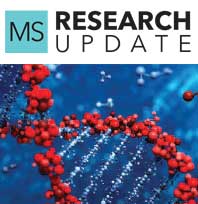Opicinumab

In this Update
FDA-Approved Medications: Recently Approved
Experimental Medications: Monoclonal Antibodies
Company: Biogen
- Given via IV infusion
- Being studied in RMS
Previous: Ublituximab | Next: Rituxan® (rituximab)
Researchers are investigating whether the monoclonal antibody opicinumab reverses neurologic damage and disability when added to existing therapy in select patients with relapsing forms of MS (RMS).
If the ongoing AFFINITY clinical trial shows a significant benefit for opicinumab as add-on therapy, the results could be the first step toward a breakthrough that could give physicians an option for restoring functional and neurologic loss in MS, rather than just slowing or preventing further decline. However, opicinumab did not show a meaningful benefit in a previous Phase II study, called SYNERGY, which examined the use of concomitant opicinumab with another disease-modifying therapy.61
MS can manifest when the myelin sheath, the protective fibers around nerve cells in the brain and spinal cord, is damaged by an abnormal autoimmune response. Opicinumab is formulated to promote myelin sheath repair by blocking the effects of LINGO-1, a protein that hinders development of myelin-generating cells called oligodendrocytes. It is hoped that allowing oligodendrocytes to proliferate will restore damaged myelin, offering the potential for opicinumab to prevent and possibly reverse disability.62 Opicinumab has been shown in animal studies to restore myelin, and investigators hope to replicate that effect in humans.
In the Phase II SYNERGY trial, 418 adults with RMS received interferon beta-1a at 30 micrograms per week, plus IV opicinumab every four weeks or a placebo infusion. Opicinumab was dosed at 3, 10, 30, or 100 milligrams per kilogram (about 2.2 pounds) of body weight. After 72 weeks, disability was lessened in between 40% and 65% of those individuals who received opicinumab at any dosage. Similar benefits, however, were seen in 49% of the other group. The investigators found no overall dose-related benefit with opicinumab, but found an increased rate of discontinuation with the higher doses.61
However, a later analysis of the SYNGERGY findings showed more-robust treatment responses in a subgroup of individuals whose first MS symptom came within the past 20 years. These patients also had magnetic resonance imaging (MRI) findings that indicated that some nerve fibers remained intact despite myelin damage, suggesting that more nerve fibers and myelin may have been preserved. A lower proportion of people in this subgroup showed confirmed disability worsening with the 10 mg/kg dosage of opicinumab, and more of these individuals showed positive effects on exploratory biomarkers of central nervous system repair. These findings prompted Biogen, the developer of opicinumab, to continue assessing the medication’s potential effects on myelin reconstruction.
The AFFINITY trial is following 263 people with RMS who are being treated with interferon-based DMTs, Tecfidera, or Tysabri. Participants will receive intravenous opicinumab at 750 mg or a placebo IV infusion every four weeks as an add-on to their current therapy for 72 weeks.63 Several tests will be performed throughout the trial to measure treatment effect on participants’ cognitive and physical function. Study completion is scheduled for May 2022.63
